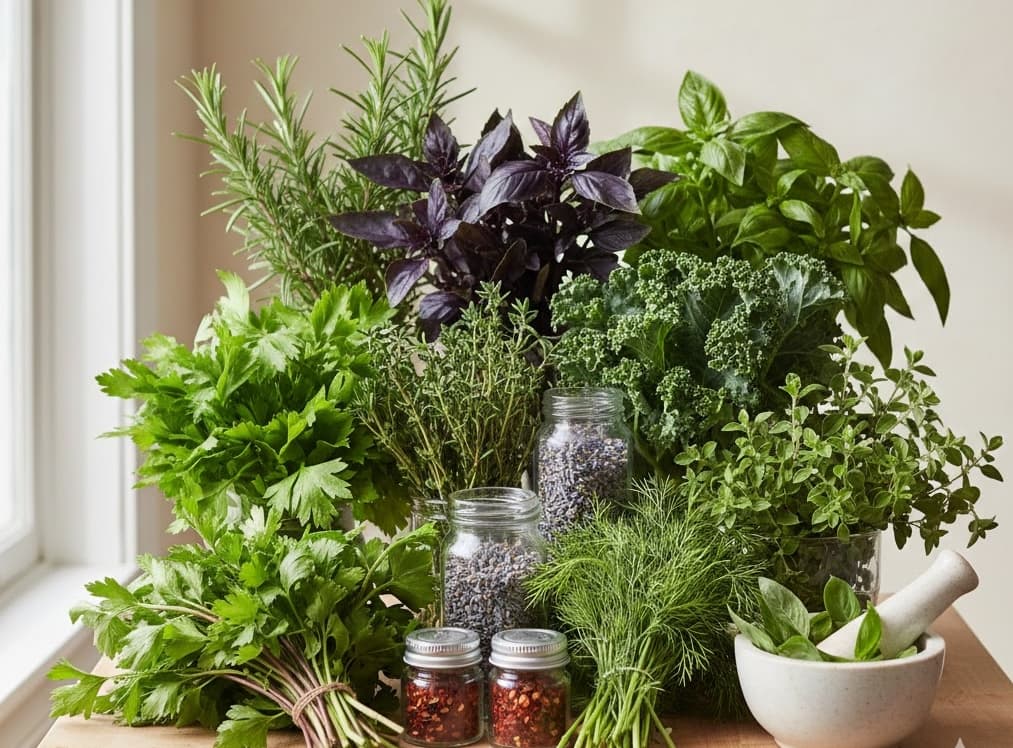Herbs Market: Sustainability, Innovation, and Global Demand
Herbs aren’t just for your grandma’s soup anymore. They’re in everything from tea and smoothies to face creams and supplements. Mint for a salad or turmeric for inflammation, herbs are having their moment. But as they become more mainstream, there’s more talk about where they come from, how they’re grown, and what’s actually in them. Let’s get into why herbs are hot and what’s going on behind the scenes.

200+ buyers trust Torg for sourcing

More People Are Choosing Herbs—In Food, Health, and Everything in Between
Herbs have been around forever. They’ve seasoned food and helped with everyday health things for thousands of years. But now more people are looking for natural ingredients over processed ones. That’s why herbs suppliers offerings like basil, oregano, chamomile, and echinacea are showing up not only in the kitchen, but also in vitamin bottles and on face care products.
Whether it's herbal teas to induce sleep, turmeric lattes for inflammation, or rosemary oil for hair, folks are truly embracing natural, plant-based alternatives. And as a result, the demand for fresh, processed, and dried herbs suppliers is rising rapidly.

But There's a Catch: How Herbs Are Grown Matters
As we all take more herbs off the shelves, there's one huge question: how are these plants actually being cultivated?
As it turns out, it's not always that easy. Many wild herbs are being overharvested, particularly where they naturally occur. Not only does this harm the environment, but it also threatens to wipe out some plants.
So now there's more emphasis on raising herbs the correct way, no pesticides or strong chemicals. That's where organic farming enters. It's kinder to the earth and healthier for humans, particularly the farmers who are actually doing the work.
And talking about farmers, most herbs are grown on small, family-owned farms in third-world countries. Ensuring they're being treated well and paid fairly is a large portion of keeping the herb business ethical. That's why "organic" or "fair trade" certifications are important. They're not labels, they indicate that someone's caring about the growers and the earth.
Understanding Where Your Herbs Are From
Another thing people really care about? Traceability. Essentially, they don't want to know where their herbs came from, who raised them, and how. More brands are using technology such as QR codes or tracking technology so that you can scan the packaging and hear the whole story. It provides peace of mind and enables buyers to make better decisions.
What's New: Smarter Packaging and Cooler Products
Okay, let's change the subject. It's not all about how herbs are cultivated. It's also about how they're marketed and consumed.
Keeping Herbs Fresh (Without Wrecking the Planet)
No one likes wet basil or wilted oregano. So, herb packaging is finally getting an upgrade. More companies are employing sustainable materials, such as compostable bags or paper wraps, to preserve herbs while not contributing more plastic to landfills. And they're making packaging resealable, breathable, and just better in general. Check out fresh basil suppliers here.
Customized Herb Combinations Are Really Taking Off
Herbs are not one-size-fits-all any longer. Increasingly, individuals are purchasing special blends—"sleep better" combinations or "immune boosters" with a variety of herbs mixed together. And then there are adaptogenic herbs (such as ashwagandha or holy basil), which are appearing in lattes, powders, and snacks. Individuals enjoy them for stress reduction and overall health.
Short version, herbs aren't pantry items anymore. They're turning into lifestyle products.

Final Thoughts
Herbs are sort of everywhere these days, and for good reason. They're natural, adaptable, and have a whole lot of positives. But with all the interest, it's really, really important that they're being cultivated in a way that's friendly to the earth and fair to the people working behind the scenes.
Between smarter packaging, better farming, and more personalized products, the herb world is certainly upping its game. And as long as we keep supporting the farmers and being responsible about how we source herbs, there's no reason we can't indulge in all the best that herbs have to offer, without any guilt.

Tims Herbs
Company Name – Tims Herbs
Headquarters – Croatia
Core Products – Organic chamomile (dried flower heads, extracts, herbal blends)
If chamomile lived somewhere, it'd be with Tims Herbs in Croatia. These guys have been Chamomile all the way since 2002, and it shows in the experience and quality they bring. From cultivating it organically out in the fields to processing it in state-of-the-art facilities, everything is designed to provide high-quality, clean, and consistent chamomile products.
Whether you are a tea company, supplement company, or simply someone who enjoys a calming cup of something from nature, they have you covered. They are not mass producers; they are doing it the right way.
Tims Herbs is also committed to sustainability, ensuring their farming practices and production remain environmentally friendly. With twenty years of experience, it's no surprise they've become a go-to supplier for businesses that are concerned with what goes into their products and where it comes from.
Request a Bulk Order Quote
Simple ordering, transparent pricing, delivered straight to your door

